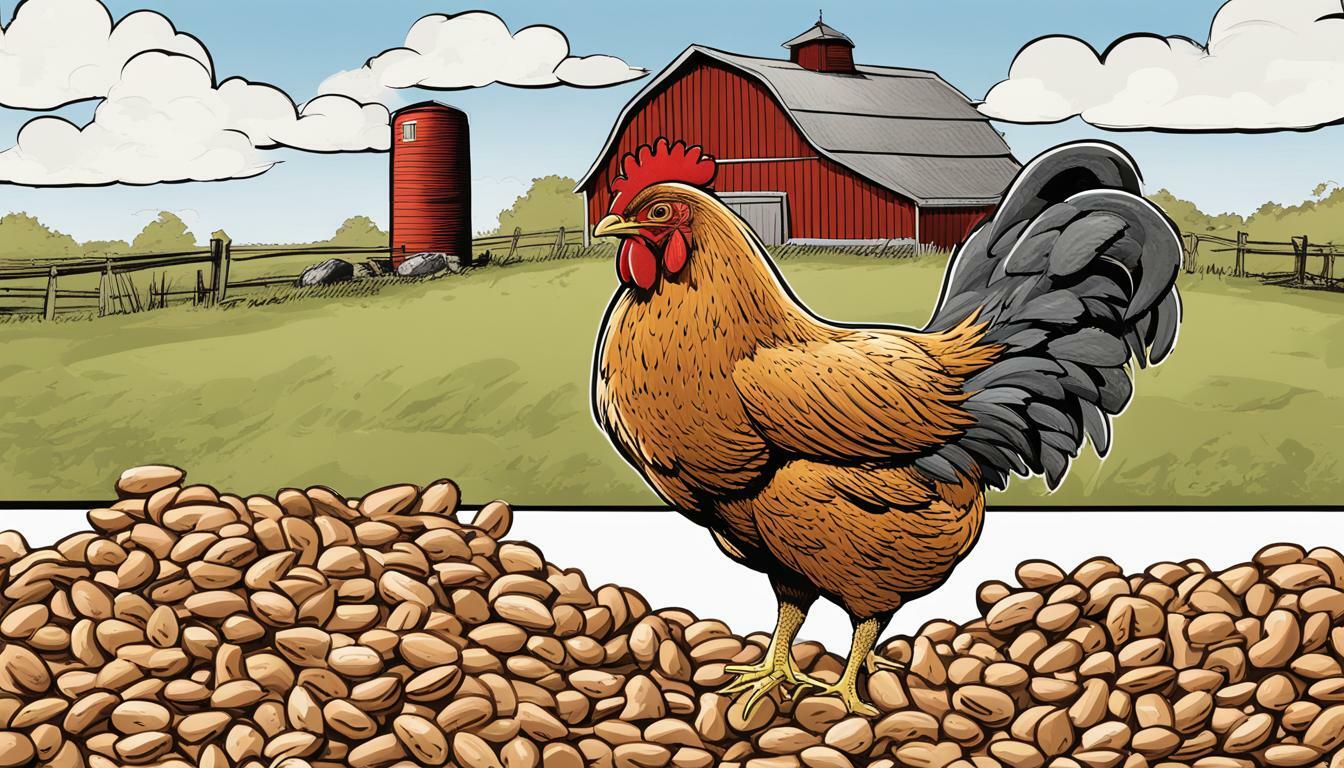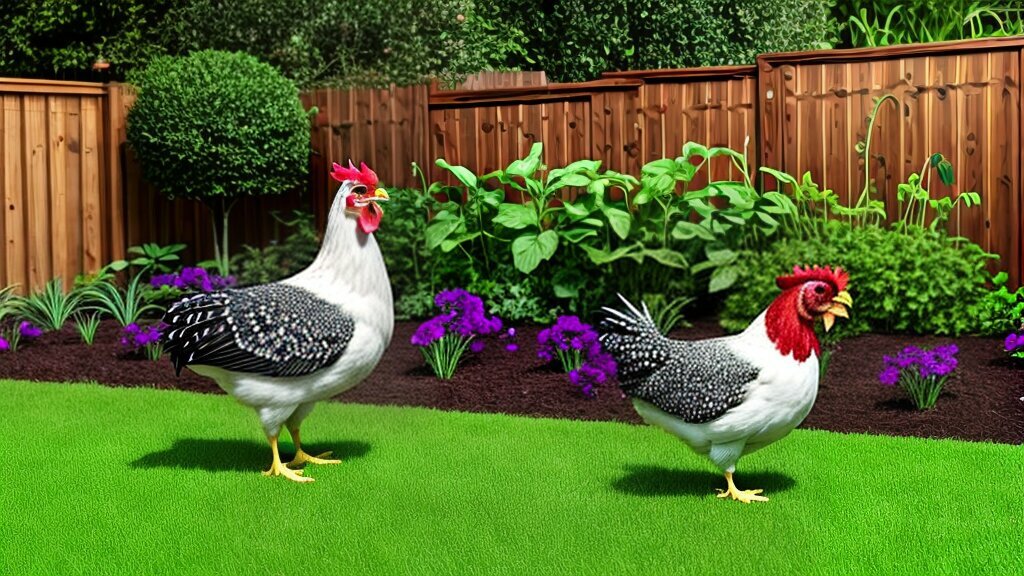Can Chickens Eat Nuts? Nutritional Insights for Flock Owners

Table of content:
- Can chickens eat peanuts?
- Are peanuts good for chickens?
- What nuts can chickens eat?
- Are almonds safe for chickens?
- Can chickens eat walnuts?
- Are cashews bad for chickens?
- Can I feed my chickens pistachios?
- Are macadamia nuts ok for chickens?
- Can chickens eat hazelnuts?
- Are brazil nuts toxic to chickens?
- Conclusion
Chickens can eat certain nuts in moderation as part of a balanced diet. Nuts can provide beneficial fats, protein, fiber and nutrients. However, some nuts may be toxic or harmful to chickens if fed improperly. Knowing which nuts are chicken-safe and how to feed them is key.
Can chickens eat peanuts?
Yes, chickens can eat peanuts in moderation. Peanuts contain healthy fats, protein, fiber and vitamins that may benefit chickens. However, peanuts are high in fat so only feed small amounts as occasional treats.
Peanuts should be unsalted and free of additives. Feed shelled peanuts rather than peanuts in the shell, which increases risk of choking. Limit peanuts to a tablespoon per chicken, a few times a week. Observe chickens after feeding peanuts and discontinue use if any issues arise.
Are peanuts good for chickens?
Peanuts offer nutritional benefits but also potential risks. The pros of feeding peanuts to chickens include:
- Good source of plant-based protein and fiber
- Provides healthy fats like monounsaturated and polyunsaturated fatty acids
- Contains vitamins E, K, B3, folate, thiamine, zinc and magnesium
- May promote weight gain and growth in chicks
- Can increase egg size and production
However, potential cons of peanuts for chickens include:
- High in fat and calories if overfed
- Risk of obesity, liver damage or reproductive issues
- May cause odd flavors or fishy taste in eggs
- Can harbor mold or toxins if stored improperly
- Choking hazard if fed peanuts in shell
- Allergy risks in sensitive flocks
Overall, peanuts can be a healthy treat for chickens in moderation, around 1-2 times per week. Monitor your flock and adjust as needed.
What nuts can chickens eat?
In addition to peanuts, some other nuts that are generally safe for chickens include:
- Almonds – Rich in vitamin E and healthy fats. Limit to a few per chicken as high fat.
- Walnuts – High in omega-3s but can cause odd yolk color. Feed sparingly.
- Cashews – Contain protein, fat and minerals. Should be unsalted and limited.
- Pistachios – Nutrient-dense but high in fat. Feed pruned pistachios as a treat.
- Hazelnuts – Source of vitamin E, magnesium and fiber. Give only a few at a time.
- Brazil Nuts – Excellent source of selenium but very high in fat. Limit to just 1 nut per chicken.
Nuts to avoid include macadamia nuts, which can be toxic. Oily nuts like pecans can cause diarrhea. In general, feed any nuts in very limited quantities. Observe your chickens closely when introducing new nuts to ensure they don’t cause issues.
Are almonds safe for chickens?
Yes, almonds are generally considered safe for chicken consumption in moderation. Almonds provide healthy fats, protein, fiber and vitamin E, benefiting feather and immune health.
However, almonds are high in fat so only feed 1-2 per chicken, a few times weekly. Also, limit almond consumption during hot weather, as the fat content may go rancid and pose health risks.
Only feed plain, unsalted almonds. Avoid raw bitter almonds, which contain toxic cyanide compounds. Introduce almonds slowly and watch for signs of diarrhea, illness or changes in egg production. Discontinue use if any concerns arise.
Overall, almonds make a fine supplemental treat for chickens when fed carefully and in small amounts. Their vitamin E content can give hens a nutritional boost.
Can chickens eat walnuts?
Walnuts are generally safe for chickens to eat in moderation. Walnuts provide omega-3 fatty acids, protein, fiber and minerals.
However, walnuts do pose some risks including:
- Very high fat content can cause obesity if overfed
- May affect the taste or odor of eggs
- Can cause egg yolk color changes to orange or yellow
- Mold risk if stored incorrectly due to high oil content
- Allergy risks in sensitive birds
For optimal safety, only feed walnuts occasionally as a treat. Limit treats to a few halves per chicken, once or twice a week. Introduce slowly and watch for any diarrhea, appetite changes or odd egg qualities.
Overall, walnuts make a fine supplemental addition to the flock’s diet when fed prudently in small quantities. Their omega-3 content benefits chicken health. But as with any treat, feed walnuts in strict moderation.
Are cashews bad for chickens?
No, unsalted cashews are not inherently bad for chickens when fed carefully in moderation. Cashews contain beneficial nutrients like protein, healthy fats, iron, magnesium and zinc. Their soft texture also lowers risk of choking.
However, cashews are still high in fat. Limit treats to a few halves per chicken, 1-2 times weekly. Stop feeding if chickens show signs of diarrhea, illness or obesity.
Store cashews properly as well, as they can harbor mold if kept incorrectly. Feed only fresh, unsalted nuts free of黑 mold or rancidity.
Overall, an occasional cashew can provide nutrients and variety. But as with any treat, moderation is key. Limit the amount, frequency and number of chickens receiving cashews to prevent over consumption and potential health issues.
Can I feed my chickens pistachios?
You can offer your chickens pistachios as an occasional treat, but certain precautions should be taken:
- Remove shells before feeding, as they pose a choking risk
- Feed only pruned, salted pistachios to limit fat content
- Limit treats to a few nuts per chicken, 1-2 times weekly
- Introduce slowly and watch for signs of diarrhea or illness
- Discontinue use if eggs develop changes in flavor, odor or color
- Store pistachios properly to avoid mold growth or rancidity
Overall, a few pruned pistachios provide protein, vitamins and minerals for chickens. But monitor for adverse effects and limit treats to no more than twice weekly. The high fat content can cause health issues if overfed.
Are macadamia nuts ok for chickens?
No, macadamia nuts should not be fed to chickens. Macadamia nuts contain toxins that can cause neurological issues and paralysis in birds. Even small amounts may be harmful.
Signs of macadamia nut poisoning in chickens include:
- Weakness, tremors, or inability to walk
- Paralysis of legs, wings or neck
- Difficulty breathing or swelling of throat
- Vomiting, diarrhea, abdominal pain
- Death in severe cases
If you suspect a chicken has eaten macadamia nuts, remove access immediately. Provide supportive care such as hydration and rest. Seek veterinary advice if symptoms persist for more than 12 hours.
To keep your flock safe, never feed standard macadamia nuts or products made with macadamia nuts, oils or shells. The risks far outweigh any potential benefits for backyard chickens.
Can chickens eat hazelnuts?
Hazelnuts can be fed to chickens in very limited quantities as an occasional treat. Hazelnuts provide protein, vitamin E, manganese, magnesium and healthy fats. However, they are calorie-dense so moderation is key.
Feed only a few hazelnuts per chicken, 1-2 times weekly at most.Monitor for weight gain or diarrhea and discontinue use if either occurs. Remove shells before feeding as hazelnuts can cause choking.
Store hazelnuts properly as well to prevent mold growth. Rancid nuts can cause illness. Introduce slowly and stop feeding if any issues arise.
Overall, the vitamin E in hazelnuts can benefit chickens. But feed only limited amounts, sporadically. Their high fat and protein content poses health risks if overfed to backyard flocks.
Are brazil nuts toxic to chickens?
While nutritious, brazil nuts do contain compounds toxic to chickens if overfed. Brazil nuts are extremely high in selenium, an essential mineral. But excess selenium can poison birds.
Signs of selenium toxicity include:
- Loss of feathers
- Deformed nails or beak
- Lameness
- Paralysis
- Breathing issues
- Blindness
- Heart failure
- Death
To prevent toxicity, brazil nuts should only be fed to chickens in very limited quantities – no more than one small nut per bird, once or twice a month. Monitor closely and stop feeding if adverse effects appear.
While safe in strict moderation, it’s generally best to avoid brazil nuts for backyard chickens. The risks outweigh the benefits when other, safer treat options exist.
Conclusion
Most nuts can be fed to chickens in limited quantities as supplemental treats. They provide protein, healthy fats and nutrients that can benefit chicken health. However, chickens cannot eat unlimited amounts of nuts. Over consumption poses significant health risks in backyard flocks.
When feeding nuts to chickens:
- Introduce new nuts slowly and watch closely for any adverse effects
- Limit treats to a few pieces per chicken, 1-2 times per week at most
- Rotate different types of nuts to add variety and prevent boredom
- Stop immediately if chickens show any signs of illness
- Store nuts properly to prevent mold growth or rancidity
With prudence and moderation, many types of nuts make suitable occasional treats for chickens. But always feed nuts sparingly as part of a balanced diet. Avoid any nuts that are moldy, rancid or raw. Using common sense and caution helps ensure nuts safely provide nutritional variety without harming flock health.
Welcome. I’m Adreena Shanum, the proud owner of this website, and I am incredibly passionate about animals, especially poultry. I founded adreenapets.com as a labor of love, stemming from my desire to share my knowledge and experiences with poultry enthusiasts worldwide.




